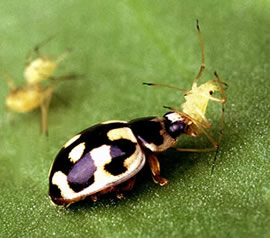
Joint EPPO/IOBC Panel Meeting on Biological Control Agents
Wageningen (NL), 2008-03-26/28
This meeting took place in Wageningen (NL) and members from both the re-activated EPPO Panel on Safe Use of Biological Control and IOBC (West Palaearctic and East Palaearctic regional sections) participated. The reasons to re-activate the Panel (the last meeting of the EPPO Panel on Safe Use of Biological Control was held in 2002) were the necessity to revise the positive lists of invertebrate biological control agents (IBCAs) recommended for use by EPPO countries (EPPO Standard PM 6/3) and, to consider the criteria for future additions of IBCAs to and deletions from the positive lists.
The joint Panel discussed proposed deletions from the positive lists of the EPPO Standard PM 6/3 and agreed to delete (these will be moved to a list of «formerly recommended» IBCAs after their deletion) the following species:
- Harmonia axyridis (Appendix II),
- Lysiphlebus testaceipes (Appendix I and II),
- Neoseiulus californicus (diapausing strain) (Appendix I).
The joint Panel discussed proposed modifications to the Appendix I and II of the EPPO Standard PM 6/3 and agreed on some of them. Participants believed it would be useful to discuss the concept of ecozones and to make more distinctions between different parts of the EPPO region in the future.
The joint Panel discussed the proposals of the EU’s REBECA project (Regulation of Biological Control Agents) concerning the information needed on IBCAs (to make decisions on additions to the positive lists), modified and completed information requirements of the EPPO Standard PM 6/3 (Appendix I and II). Participants considered that discussion on 'thermal biology' (including climatic zoning, thermal thresholds, etc.) would be useful and should be organized at the next Panel meeting. Participants agreed to send their proposals of additions of IBCAs to the positive lists with information according the agreed requirements.
The EPPO/IOBC group thought that the approach developed by the REBECA project of EU concerning the procedure for updating the positive lists could be considered by EPPO including placing new IBCAs proposed for addition into the DRS (Database on the Regulatory Status) for a period of five years. During that time their safety could be assessed. The joint EPPO/IOBC members agreed that all information on IBCAs intended for their inclusion on the positive lists should be collected according to the new information requirements. The group also decided to regularly inform industry on its decisions on deleting and adding IBCAs to the positive lists to allow industry to react to these decisions.

